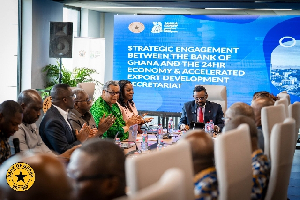One of the aspects of our educational system that is hardly talked about is the education of students with special needs. Although I have been concerned about the challenges of educational provision for such students in Ghana, I have also been quite optimistic until last week when I read a Ministry of Education statement about the issues of teaching and student outcomes.
At the opening of a five-day in-service training workshop for Senior High School (SHS) teachers at the Ghana Education Staff Development Institute (GESDI) in Ajumako (24th March 2010), Madam Victoria Opoku, Director in charge of Secondary Education made a startling revelation. She revealed that despite in-service training programs and other extra classes, the performance of SHS students in recent times was at its lowest. This revelation is alarming and worrying not just for mainstream students but more especially for those students with special needs and Ghana’s the inclusive education agenda.
The concept and philosophy of inclusive education gained international currency from the 1990s, with The United Nations inclusion education conference in Thailand, promoting the idea of “Education For All”. Then the 1994 conference on inclusive education in Salamanca, Spain led to the policy statement that proposed that the development of schools with an inclusive orientation was the most effective means of combating discriminatory attitudes, providing effective education for majority of children, and ultimately improving the cost-effectiveness of the entire educational system (UNESCO, 1994). Ghana, along with other countries was signatory to the Salamanca declaration and pledged to set in motion the mechanisms for creating an inclusive education system, which first began with experiments of integration in the 1970s. This followed the establishment of Community Based rehabilitation (CBR) programs for people with disabilities in 1992, upon the recommendation of the UNESCO Consultation on Special Education. As part of the CBR agenda, Inclusive education was piloted in 10 districts. The districts included Akwapim-North, Akatsi, Tolon-Kumbugu and Bongo districts among others (O’Toole, et al., 1996). Since the 1990s, a number of small scale inclusive programs have been attempted. What is worrying is that most are experimental and/or short-lived. The Ministry of Education’s Strategic Plan (2003 – 2015) envisions the achievement of an inclusive education system by 2015 (SpED 2005). As a result, both government and NGOs have supported inclusive education and Special needs education programs, in the last decade. The NGOs include the VSO, Savers International (SSI), and USAID. Since 2003 the Government has also initiated pilot inclusive education programs in 30 schools in Central, Eastern and Greater Accra regions. The lesson from these schools are to inform practice in other schools when broad national implementation takes place.
However, these schools are facing problems just like the other sectors of the educational system.
The problems of Inclusive education in Ghana have been noted to be around teacher attitudes and skills, resources and a gulf between policy initiation and implementation.
My own research of inclusive education practices in Ghana published in research journals (Kuyini, 2006, 2007, 2008) indicated that although teachers had relatively positive attitudes towards including students with disabilities/ special needs in regular school classrooms, they had limited knowledge of inclusive practices. Teachers were not providing the individual support to students with disabilities the generally overcrowded classrooms to allow them to achieve meaningful educational outcomes. In addition, Head-teachers or school principals’ expectations of teachers to implement inclusion activities were quite low and organisational approaches adopted by schools did not promote inclusion.
In writing this opinion piece, my concern is less about whether or not Ghana is able to undertake a meaningful nationwide roll-out of inclusive education. Rather, it is more about meeting the needs of students with special needs in an educational system swamped by huge numbers of untrained teachers; superficial skills in relation to inclusive practices and high rate of teacher turn-over. These are incredibly difficult issues to overcome.
It is also important to note that aside from these fundamental problems, the government’s approach to establishing inclusive education since the 1990s has been quite piece-meal. And as the Global e-Schools and Communities Initiative (GeSCI) noted in its report on Ghana’s inclusive education, this rather adhoc approach does not augur well for achieving the vision of inclusion in line with the EFA and MDGs agenda. The GeSCI recommends a systemic approach which requires consistent commitment of resources and stability of personnel and all other stakeholders. This is an asking which is doubtful in country and/or culture that lacks resources and perseverance, which are important to achieving long-term goals.
Although the GeSCI has accepted the Ghana Education Service’s (GES) request and has supported Ghana with Assistive Technologies for special educational needs, there is no guarantee that any meaningful support for students included in regular schools, will be achieved into the future. This conclusion is couched in the uncertainty on the part of the Government to commit resources to support issues of disability as happened with the Community Based Rehabilitation (CBR) program.
The Ministry of Education’s Strategic Plan is to develop a model for Inclusive Education within the overarching framework of Education For All (EFA). However, these issues of the education system enumerated above are always going to be stumbling blocks to achieving this vision. Furthermore, Ghana is still immersed in a situation where the structural inequalities and marginalisation of persons with disabilities easily translate into service provision arena, and the promulgation of policy lags unacceptably far behind implementation. Thus it might be a while before the implementation of any intended courses of action for addressing issues of inclusive education trickle down to those students who really need such services. In fact the admission by Madam Victoria Opoku, Director in charge of Secondary Education (24 March 2010) that despite in-service training programs and other extra classes, the performance of SHS students in recent times was at its lowest , is indicative of the problems with quality of instruction for even the most capable students. What is also of concern is the fact that teacher attrition is very high in Ghana (Cobbold, 2006) and so much of the in-service training is going to teachers who are unlikely to stay in the system to exert any positive influence on student outcomes. As mine and many others studies show, students with special needs have not been adequately supported in regular classrooms in Ghana. In this sense the poor student outcomes despite more in-service training for teachers, means that students with special needs are less likely to receive adequate support and correspondingly achieve significantly lower school outcomes than their peers. Given all these problems of the education system, achieving the goals of inclusive education as envisioned by the Ministry’s strategic plan- even a decade after 2015- is at best, a mirage.
Dr. Ahmed Bawa Kuyini
(For CEVS-Ghana, Tamale) www.cevsghana.org
Opinions of Sunday, 4 April 2010
Columnist: Kuyini, Ahmed Bawa














